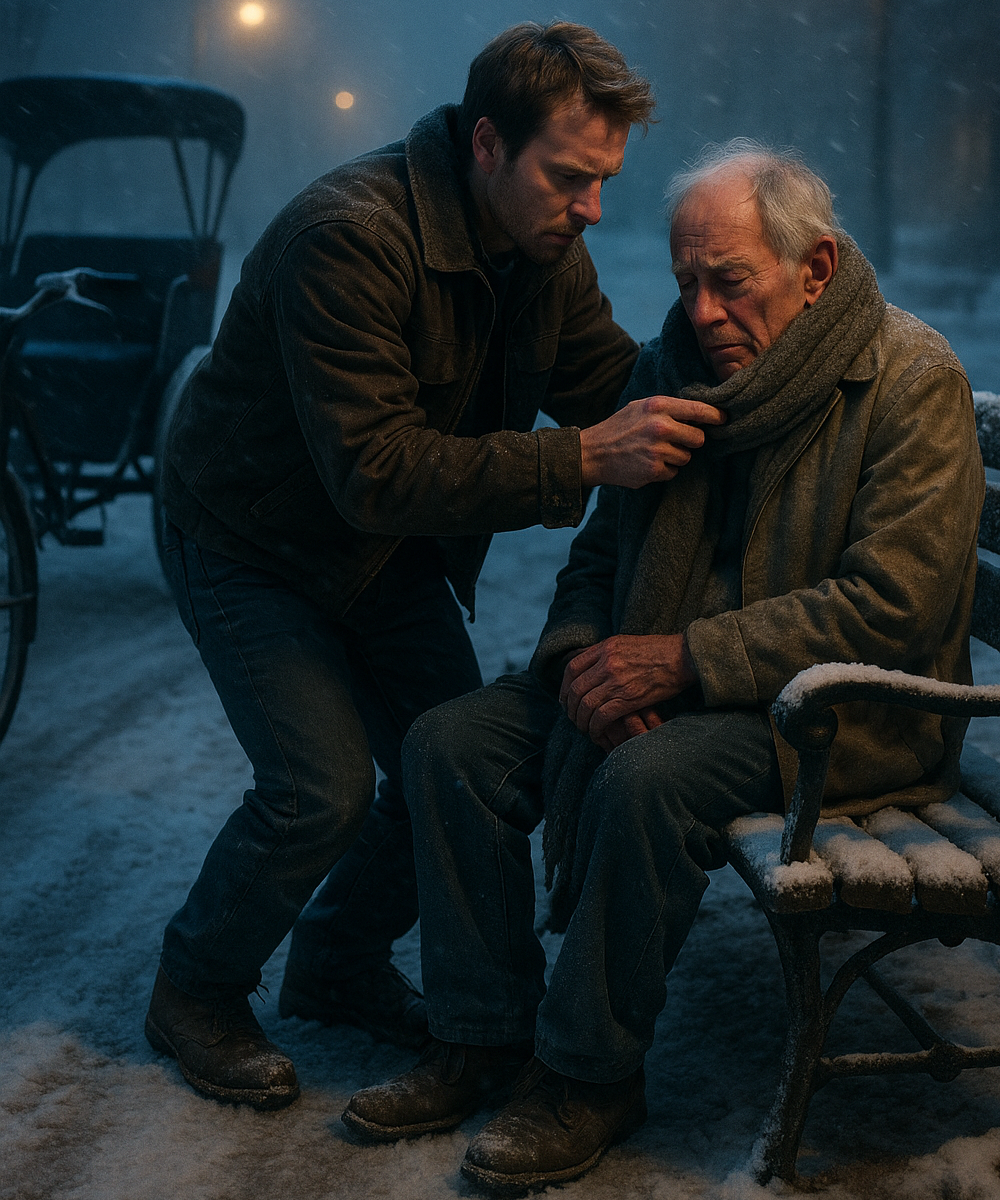The Night a Pedicab Driver Made a Choice
It was one of those bitter December nights when the cold sank into your bones. The streets of a small Midwestern town lay quiet, covered in frost, while most families stayed warm inside their homes.
But Michael, a pedicab driver in his mid-thirties, was still out. Life hadn’t been kind to him—most days, what he earned barely stretched far enough for groceries, his wife’s medication, and a few school supplies for his son. Even so, he kept pedaling, because stopping wasn’t an option.
That night, just as he was about to head home, Michael spotted an old man sitting on a bench near the roadside. The man wore a thin coat, his shoes worn down to the sole, his hands shaking uncontrollably in the freezing air.
Michael slowed, bringing his pedicab to a stop.
“Sir, are you okay?” he asked gently.
The old man’s voice cracked.
“Son, could you give me a ride home? I don’t have money, but I can’t take this cold anymore.”
Michael didn’t think twice. He pulled off his own woolen scarf and wrapped it around the man’s shoulders.
“Come on, sir. Sit down. The night’s too cruel to face alone.”

Hot Tea on a Frozen Road
The pedicab rolled slowly down the empty street. Soon, the old man began coughing, his frail frame shuddering. Michael stopped at a small all-night diner, bought two cups of steaming coffee, and handed one over.
“Here, drink this. It’ll warm you up,” he said.
The man’s eyes welled with tears.
“Are you an angel?” he whispered.
Michael only smiled, saying nothing. Sometimes kindness didn’t need words.
After nearly half an hour, they reached an old, weathered house in a rundown neighborhood. Michael helped him up the steps.
“This your place?” Michael asked softly.
The man nodded.
“Yes, son. What you’ve done tonight can’t be repaid with money. God will surely bless you.”
Before Michael could respond, the old man closed the door. Michael turned his pedicab toward home, never imagining that this simple act would change his life forever.
The Phone Call
At dawn, before the sun had risen, Michael’s phone rang. Half-asleep, he answered.
“Hello?”
A steady voice spoke on the other end.
“Are you Michael Harris? Did you drop off an elderly man on Oak Street last night?”
Michael’s heart skipped.
“Yes… sir, is everything alright?”
“This is the police. Please report to the station right away. It’s important.”
Michael’s palms turned cold. Had something happened to the man? Did he make a mistake? Fifteen minutes later, he stood inside the station, three officers waiting.
“You’re the one who drove that old man last night?” one asked.
“Yes, sir, but… did I do something wrong?” Michael stammered.
The officer shook his head.
“Wrong? No. You set an example.”
Who the Old Man Really Was
Michael frowned in confusion. Then the chief explained—
The man he had helped was none other than Edward Whitmore, a retired Director of National Intelligence, missing from Washington for three days.
Michael’s eyes widened.
“He never told me who he was.”
Another officer smiled.
“Maybe he trusted you because you showed him humanity.”
At that moment, a black SUV pulled up outside. Two security agents stepped in.
“Mr. Harris, Mr. Whitmore wants to see you.”
Still stunned, Michael climbed into the vehicle. Soon they reached the same weathered house. Whitmore stood at the doorway, smiling warmly.
He hugged Michael tightly.
“Son, I’ve seen a lot in my life, but rarely hearts like yours. You helped without asking who I was, without expecting a thing in return. That’s what America needs to see.”
Tears blurred Michael’s eyes.
“Sir, I only helped a man in need.”
From a Bench to a Stage
By mid-morning, Washington’s government guest house was surrounded by security. Media crews crowded outside, officials hurried about inside—but all eyes turned to Michael, the humble pedicab driver who had offered his scarf on a freezing night.
He was called on stage, nervous in his worn jacket, eyes damp. Before him stood the Secretary of Defense, the Attorney General, and Mr. Whitmore himself.
Whitmore took the microphone.
“I’ve spent my life protecting this nation from outside threats. But last night I learned something—true protection doesn’t come from weapons. It comes from compassion, from citizens who still care.”
From his pocket, he pulled out a medal.
“I give my personal honor, the Service Symbol, to this man—because he reminded me America still breathes through its ordinary sons.”
The hall erupted in thunderous applause as the medal was placed around Michael’s neck.
Then the Secretary of Defense stepped forward.
“On behalf of the government, we appoint Michael Harris as a representative of the National Service Mission. He will travel the country, showing people what service truly means.”
A Life Transformed
Michael stood speechless. Just yesterday, he had been counting coins to buy medicine for his mother. Today, he was being honored before the nation. Cameras flashed, headlines ran: Pedicab Driver Rekindles the Soul of America.
In a corner of the hall, his mother smiled through tears.
“Son, you’ve truly become great—not with money, but with your heart.”
Life changed after that. Neighbors who once overlooked him now greeted him with respect. His story spread on TV, in newspapers, and across the internet. Yet Michael stayed the same—humble, simple, grounded—though now, invitations to speak at events poured in.
The Student’s Question
One day, speaking to a class of high schoolers about service, a boy raised his hand.
“Sir, why did you help that old man? What if he was just a beggar?”
Michael paused, then spoke softly.
“A beggar isn’t less than anyone. We grow by helping. And worth is never measured by clothes.”
The students clapped, but it was the teachers who left with heavy thoughts, carrying his words long after.
